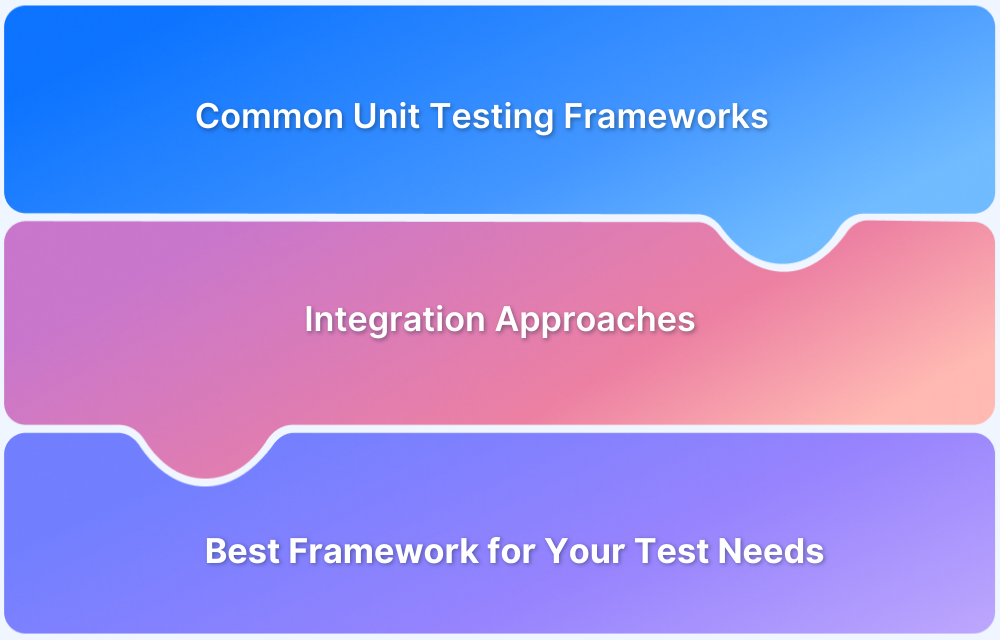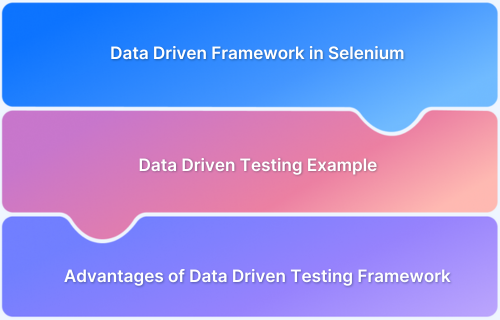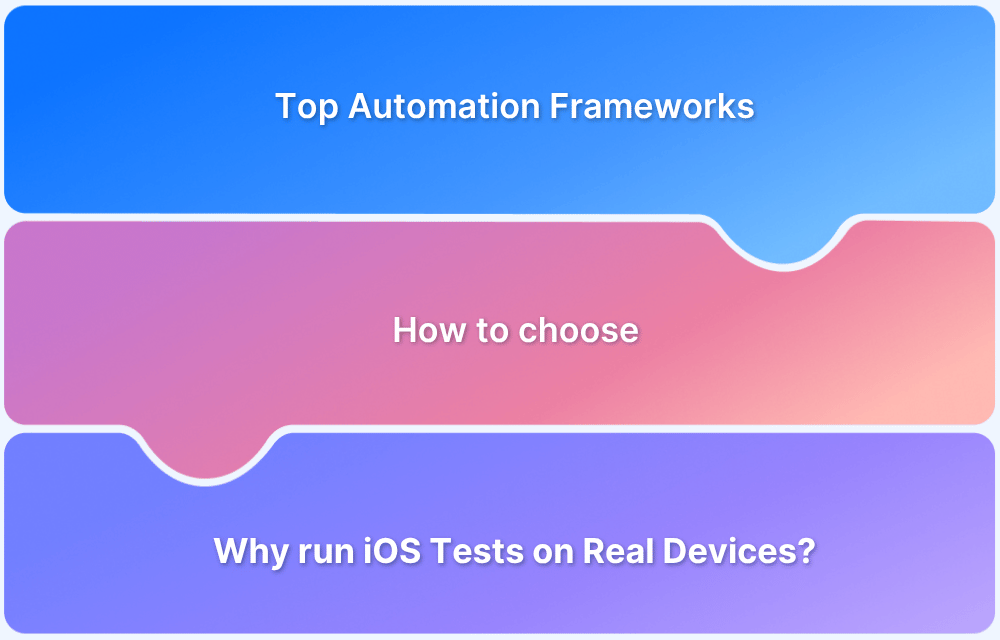Selenium is a powerful framework used for automating web applications across different browsers. It allows developers to simulate user interactions with a web application to verify its functionality and performance. Unit testing with Selenium involves writing test scripts to check individual components of an application, ensuring each part functions as expected before integration.
Overview
Unit Testing Frameworks in Selenium
- Purpose: Unit testing ensures that individual components of an application function correctly, helping to catch bugs early in the development process.
- Integration with Selenium: Selenium integrates with various unit testing frameworks across different programming languages, enabling automated testing of web applications.
- Language-Specific Frameworks: Popular frameworks include JUnit and TestNG for Java, PyUnit (unittest) for Python, and Mocha and Jasmine for JavaScript.
- Benefits:
- Improved code quality and reliability.
- Faster identification and resolution of issues.
- Enhanced maintainability and scalability of test code.
This article explores how Selenium can be leveraged for unit testing, discuss best practices, and guide you through setting up and running automated tests for web applications to achieve more reliable and efficient testing cycles.
What is Unit Testing?
Unit testing comprises the top level of tests in the software development life cycle. It involves validating the smallest piece of code that can be logically isolated. Unit Testing helps ensure that every single feature or component of an application works as intended.
Developers perform unit testing in the development sprint stages itself. This helps them identify and fix minor errors that can lead to major bugs in later phases. Earlier, performing unit tests on a developed module was a tedious and time-consuming task as developers had to manually test code for each component. This led to delays in final release timelines.
However, with the growth in automation tools like Selenium, unit testing has become faster and more convenient. As developers use different programming languages to code for web applications, they must select a unit testing framework compatible with their preferred programming language.
Thus, it’s important for teams to be aware of the language-specific frameworks that can help them perform unit tests.
This article describes a few widely used unit testing frameworks for popular programming languages like Java, Python, JavaScript, Ruby, etc. that integrate easily with Selenium.
Pro Tip: Run automated Selenium tests on BrowserStack’s real device cloud.
Let’s begin with unit testing frameworks available for JavaScript.
JavaScript Frameworks for Unit Testing with Selenium
Here are some of the JavaScript Frameworks for unit testing with Selenium:
1. JEST
Developed and maintained by Facebook, JEST is unarguably the most popular open-source Javascript testing framework. Although JEST is capable of covering functional, end-to-end, and integration tests, developers prefer using it primarily for unit testing. It is preferred mainly for testing React-based applications. A major advantage offered by JEST is its delivery of the zero-configuration testing experience. This means that teams or individuals need not spend too much time configuring the test environment.
Key Advantages of JEST
- JEST comes bundled with a snapshot testing tool and a built-in tool to evaluate code coverage
- Compatible with VueJS, NodeJS, Angular, and other Babel based projects
- Firm documentation support with a standard syntax
- Delivers zero-configuration experience
2. Jasmine
Introduced in 2010, Jasmine is another JavaScript testing framework that developers or QAs can use for unit testing. RSpec, JSSpec frameworks positively influence it, and it supports Behavioral Driven Development (BDD). Jasmine is capable of testing all types of JavaScript applications.
Jasmine allows developers and QAs to automate end-user behavior with custom delay. This helps simulate actual user behavior. As Jasmine facilitates visibility testing as well as responsive testing, it is mainly preferred for frontend testing.
Key Advantages of Jasmine
- It doesn’t require a Document Object Model (DOM)
- Provides support for both backend and frontend tests
- The intuitive syntax makes it easy to code
- It has firm documentation and community support
Also Read: Top 5 JavaScript Testing frameworks
Now let’s explore unit testing frameworks available for Java.
Java Frameworks for Unit Testing with Selenium
Java is widely used for developing web applications. For performing unit tests on Java-based applications, developers often use two frameworks: JUnit and NUnit.
1. JUnit
Developed by Erick Gamma and Kent Beck, JUnit is the preferred choice for automating unit tests for Java-based applications. It was developed with the sole intention of writing and running repeatable tests. JUnit testing framework supports test-driven development. As with everything, JUnit has evolved over the years and can be easily integrated with Selenium.
Key benefits of JUnit
- Makes it easy to create automated, self-verifying tests
- Provides support for test assertions
- Supports Test-Driven Development
- Supported by almost all IDE’s
- Can be integrated with build tools like Maven and Ant
2. TestNG
TestNG (NG – Next Generation) is a well-known test automation framework designed particularly for Java. It is inspired by NUnit and JUnit and comes bundled with additional functionalities to overcome the limitations of JUnit. This means TestNG is designed to cover all the categories in testing – Unit, Integration, Functional, and End to End testing.
Using TestNG Framework, developers or QAs can create more flexible test cases that leverage functionalities like grouping, sequencing, and parameterizing. One can also generate proper test reports to evaluate failed and successful tests.
Key Benefits of TestNG
- Allows developers or QAs to assign priorities to test methods
- Allows execution of Data-Driven Tests using @DataProvider annotation in TestNG
- Allows grouping of test cases for convenient test suite management
- Provides testers with detailed test reports
- Provides easy to understand annotations
- Handles unidentified exceptions automatically, and these exceptions are mentioned as failed steps in the report
Try Running Selenium Tests for Free
Python Frameworks for Unit Testing with Selenium
1. PyUnit or UnitTest
PyUnit or UnitTest is a standard test automation framework for unit testing that comes bundled with Python. This framework was originally influenced by JUnit. In PyUnit, the base class TestCase provides all assertion methods as well as the cleanup and setup routines. It is also capable of generating XML reports similar to those in JUnit using the UnitTest-xml-reporting test runner. QAs can also use the load methods and TestSuite class for grouping and loading the tests.
Key benefits of UnitTest
- As the UnitTest framework comes bundled with the Python library, there is no specific configuration or additional installation required
- Provides instant reports for test analysis
- Using UnitTest is convenient, even for users not skilled at Python
- Execution of test cases is hassle-free
2. PyTest
PyTest is another popular open-source test automation framework for testing Python-based applications. Although PyTest supports all types of testing, it is primarily used for API and complex functional testing. PyTest makes it easy to test databases, UIs, and APIs with its intuitive syntax. It is also capable of running parallel tests. With features such as assert rewriting and flexibility to integrate with third-party plugins, popular projects like Dropbox and Mozilla have chosen to switch from UnitTest to PyTest.
Key benefits of PyTest
- It’s open-source and allows integration with a rich set of third-party plugins
- Allows execution of parallel tests
- Allows devs to create compact test cases
- Allows devs to run a specific test or a subset of tests
Ruby Frameworks for Unit Testing with Selenium
1. Test:Unit
Based on the principles of xUnit, Test:Unit is a popular unit testing framework for Ruby applications. The framework comes bundled with the standard Ruby library. It can be easily used in combination with Selenium for running automated unit tests. However, one needs to have prior knowledge of Xunit frameworks and Ruby programming prior to using it.
Key benefits of Test:Unit
- Simple assertions make it easy for developers to debug specific test cases
- Allows developers to wrap up a group of similar TestCases or TestSuites for convenient testing
- Provides comprehensive tools required to execute individual or group tests
Unit testing assures that every single piece of code is tested thoroughly right after it is created. Rapid unit testing reduces the probability of major bugs manifesting in later stages. Given this, one must be well aware of the language-specific frameworks available for web test automation and are easily compatible with Selenium.
Conclusion
BrowserStack’s Cloud Selenium Grid allows testers to run Selenium tests on real devices. It also provides integrations with multiple languages and frameworks, making it easy to initiate and perform automated tests. So developers have the freedom to choose their preferred language and run tests in real user conditions.




